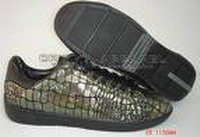Bootmaker charged with money laundering and conspiring to illegally smuggle skins of protected animals
A famous bootmaker got in jail for money laundering and conspiring to illegally smuggle the skins of protected animals into the United States to provide exotic footwear for high-end clients.

The arrest of Mexican bootmaker Martin Villegas - and Mexico's raid of a warehouse filled with hundreds of cowboy boots and belts made from endangered species - has raised questions about how much Fox knew of the scheme and whether the former Mexican president purchased illegal boots himself.
Before Fox left office in December, Villegas created a special brand of cowboy boot named after him, which he manufactured in Mexico's shoemaking capital, Leon, in Fox's home state of Guanajuato.
Villegas also made swanky footwear for Fox's bodyguards, Cabinet members, relatives and friends - including the U.S. president, a fellow lover of ranchwear who accepted a pair of ostrich-skin cowboy boots as a gift during a visit to Fox's ranch in February 2001.
Fox, in Rome for his election as co-president of an association of center-right parties from around the world, was under fire this week from Mexican media speculating not only about the boots, but the source of his post-presidential wealth.
Reached by The Associated Press in their hotel Friday, former first lady Martha Sahagun said she and Fox were aware of Villegas' arrest but would not comment.
Fox issued a blanket denial through his Web site on Friday, challenging the media to come up with hard evidence to support the allegations. "Conduct a thorough investigation, and if you find any indication of corruption, file a complaint," he wrote.
Fox's ruling National Action Party said Friday it has confidence in Fox's integrity and maintained the accusations were designed to detract attention from corruption cases involving opposition politicians.
U.S. Justice Department officials did not immediately respond to AP questions Friday about whether Fox is being investigated in connection with the case or whether the boots Bush received were illegal.
Villegas was arrested on Sept. 6 along with two other Mexican nationals and two U.S. residents following a three-year undercover operation by U.S. Fish and Wildlife Service agents. The five allegedly made 25 illegal shipments of banned skins into the U.S. since 2005, the department said.
Days later, Mexican federal agents raided the Canada Grande factory and warehouse in Leon, which is owned by one of the other Mexican suspects, Esteban Lopez Estrada. They found about 400 pairs of cowboy boots and 150 belts made of the skins of endangered sea turtles, as well as products made illegally from the hides of crocodiles, lizards and cobras.
If convicted in the U.S., Villegas and Lopez Estrada face up to five years in jail and US$250,000 (180,000 EUR) in fines for each conspiracy count, and 20 years and US$500,000 (355,000 EUR) in fines for each smuggling and money laundering count.
If Lopez is convicted in Mexico, he faces one to nine years in jail and a fine of about 15,000 to 150,000 pesos (US$1,365 to US$13,650; 970 EUR to 9,730 EUR).
The seized boots, belts, shoes and skins are being stored in an environmental protection agency office in Guanajuato, where a chain-link cage is filled with more than 200 cardboard boxes with drawings of ostriches and serpents. "Exotic Boots ... export quality," is written in red lettering on the boxes.
"They were bringing them to the United States to sell," said Eloy Urroz, Guanajuato chief of the environmental protection agency. "You can tell because they are very-well crafted."
State officials gave the AP a glimpse of the forbidden accessories on Thursday, pulling out stylishly stitched boots with uppers and tips made of shiny sea-turtle skin.
A pair of turtle-skin cowboy boots sells on the black market in Mexico for only about 750 pesos (US$70; 50 EUR). Across the border, they can fetch as much as US$500 (360 EUR), the U.S. Justice Department says. Turtle skins, which sell for about 100 pesos (US$9; 6 EUR) in Mexico, go for about US$80 (57 EUR) in the U.S.
Any commercial trade in sea turtles is prohibited under the Convention of International Trade in Endangered Species of Wild Fauna and Flora.
Urroz declined to talk about Villegas, his relationship to Fox, or whether it was possible the bootmaker was engaged in illegal trade at the time he did business with Fox. Such matters are political and do not fall under his jurisdiction, he said.
Subscribe to Pravda.Ru Telegram channel, Facebook, RSS!


